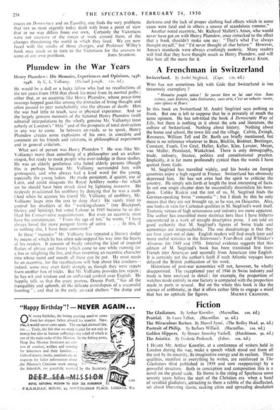Plumdew in the War Years
Henry Plumdew: His Memoirs, Experiences and Opinions, 5938- 1948. By C. E. Vulliamy. (Michael Joseph. t 2s. 6d.)
HE would be a dull or a lucky fellow who had no recollections of the ten years from 1938 that shook his mind from its normal paths ; either that, or an eccentric like Henry Plumdew, whose peace-time musings hopped goat-like among the pinnacles of living thought and often paused to peer nonchalantly into the abysses of death. Him the war had little to teach, save in physical experience. And so the largely genuine memoirs of the fictional Henry Plumdew (with editorial interpolations by the wholly genuine Mr. Vulliamy) treat soberly of London's" blitz" and of the prospects of total destruction in any war to come. In between air-raids, so to speak, Henry Plumdew creates some explosions of his own, in anecdote and comment on his friends and relations, in philosophical experiment and in general criticism.
What sort of person was Henry Plumdew ? He was (like Mr. Vulliamy) more than something of a philosopher and an archae- ologist, but ready to mock people who over-indulge in those studies. He was an elderly gentleman who hated elderly persons (though this is perhaps because Mr. Vulliamy surrounded him with grotesques), and who always had a kind word for the young, especially the young ladies. He made persistent, if quaint, use of Latin, and could misquote the Royal Artillery motto—for which sin he should have been struck dead by lightning instanter. He tirelessly proclaimed his snobbery by denying that he was a snob. (And when he accuses his friend Mr. Vulliamy of snobbery, Mr. Vulliamy leaps into the text to deny that.) He vainly tried to control his shudders at the " working-classes " (see Blackpool, Oa fery and Spitting), but voted Labour in 1945 because he so dis- liked his Conservative acquaintances. But even an eccentric must have his consistencies. " From the age of ten," he wrote, "I have always loved the more pungent forms of satire. . . . In this, if in nothing else, I have been consistent."
In these " memoirs " Mr. Vulliamy has repeated a literary dodge by means of which he has often side-stepped his way into the hearts of his readers. It consists of busily retaining the kind of inspired flashes of phrase and theory which come to one while running for a bus or relighting the fire, and then inventing an eccentric character into whose mind and mouth all these can be put. He must needs be an eccentric, for the recollections will hop about like crackers— indeed, some may even fizzle damply as though they were rejects from another box of tricks. But Mr. Vulliamy provides few rejects ; he has wit and wisdom and an unhurried control over English. He happily tells us that the crazy poetess, Doosie Prett, "has all the tranquillity and aplomb, all the delicate avoirdupois of a successful humbug " ; and that in the early air-raid shelters "the damp and darkness and the lack of proper clothing had effects which in some cases were fatal and in others a source of scandalous rumour."
Another noted eccentric, Mr. Richard Mallett's Amos, who would never have got on with Henry Plumdew, once remarked to the effect that a book shouldn't make one say : "That's What I've always thought myself," but " I'd never thought of that before." However, Amos's standards were always crushingly esoteric. Many readers will find that they have thought much as Henry Plumdew, and will


































 Previous page
Previous page